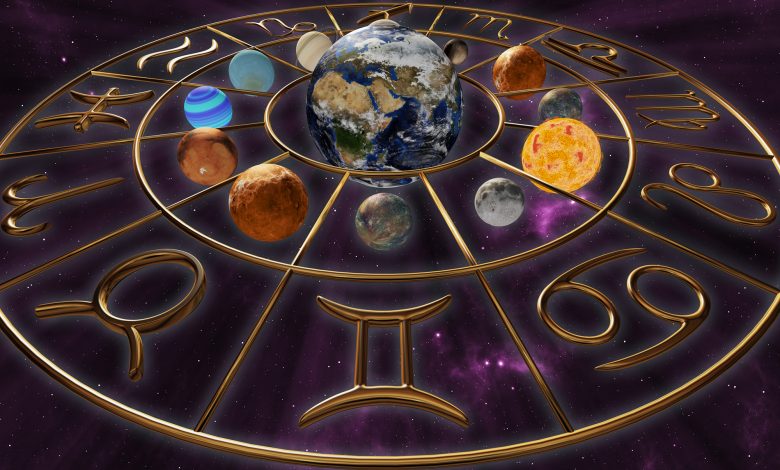Astrology And Planets

Planets in astrology have a signification that differs from what a planet means in astronomy. Before the invention of telescopes, the night sky was supposed to be made up of two types of stars: fixed stars that stayed immobile in respect to each other throughout the year and “wandering stars” that moved relative to the fixed stars during the year.
The twelve signs of the zodiac and the twelve houses manifest themselves differently. Aspects are another way in which the planets are linked to one another. On the one hand, modern astrologers disagree on the origins of the correlations between astrological positions and configurations and native qualities and fates. According to Hone, the planets directly exert it through gravity or another undiscovered influence.
Others believe that the planets have a little direct impact on their own but reflect the universe’s underlying organizing principles. In other words, the universe’s fundamental patterns replicate themselves in fractal-like patterns everywhere, and “as above, so below.”The planets symbolized the deities’ will and their direct effect on human events to ancient astrologers. According to contemporary astrologers, planets can reflect underlying drives or desires in the unconscious or energy flow regulators indicating experience levels.
According to Vedic Astrology, a horoscope has 12 houses and 9 planets. Any astrology app can tell you the significance of these planets. It can now be done from the comfort of our homes, so nobody even needs to visit their astrologer as they are not available online.
What does each of the planets portray?
Sun: Signifies ego and creative ability
The Sun isn’t technically a planet (a star), but as a luminary body in our solar system, it has the same astrological influence as the planets.
The Sun is supposed to be the driving force behind who we are at our core, and those who can accept their Sun sign are said to be happier and more satisfied. Our astrological charts have numerous impacts, but the Sun is likely the most important to our identity and soul.
Moon: Signifies emotional wealth.
The Moon is not a planet by scientific standards, yet it serves as a powerful celestial entity in astrology. In this instance, it expresses our emotions, sensations, instincts, intuition, and unconscious selves. The Moon represents our inner feelings, the aspects of ourselves that we cannot articulate. It also symbolizes our maternal side, mother, memories, and even our favorite cuisines. The Moon is in charge of our darkest, more vulnerable aspects – the bits we don’t show people until we feel comfortable and safe with them — as well as the things we need to feel safe, comfortable, and emotionally secure.
Mercury: Communicating
According to Lang, Mercury is the planet of intelligence, communication, and interior conversation. Because it is (nearly usually) the nearest planet to Earth in our solar system, it has a particularly significant impact on humans. After the Roman god of trade, after whom the planet was named, the word “mercurial” is used to characterize someone energetic, volatile, and prone to mood swings.
Venus: Love and compatibility
Venus, named after the goddess of love, enjoys loving and being absorbed in the world’s aestheticism and beauty. Venus is also related to money, particularly the money we spend on things that offer us pleasure and delight.
Mars: Energy and strength
Mars, the fiery and dynamic planetary ruler of Aries, represents our physical drive, which is why knowing which sign Mars is in may help you figure out what kind of workout would be ideal for your body.
Jupiter: Luck
Jupiter is the solar system’s largest planet. It also brings the most luck, happiness, and optimism, bringing growth, opportunity, and good feelings along with its vast presence. Through education, life experiences, and spirituality, Jupiter also aids us in broadening our horizons and expanding our thoughts; this is the planet that motivates us to pursue our ambitions, no matter how lofty they may be.
Saturn: Stability
Saturn, the sky’s structural taskmaster, is frequently discussed in astrology in terms of Saturn return, which occurs when the planet returns to the place it was in when you were born, usually in your late twenties, thus driving you into maturity. Larger esoteric issues about purpose and identity might arise due to the huge milestones or life transitions that are common at this period, which typically coincide with growing pains.
Uranus: Innovation
Uranus is all about upsetting the status quo, rejecting tradition, and questioning the existing quo, so anticipate the unusual. Uranus is progressive, forward-thinking, and hyper-creative, but it’s also prone to sudden swings and changes – you never know what will happen next or when with Uranus.
Neptune: Inspiration
This remote planet is associated with our goals, fantasies, and mystical tendencies (it is, after all, the ruler of Pisces). When Mercury enters retrograde motion, as it did at the end of last year, it might raise reality versus illusion issues, leading you to want total honesty from yourself and others.
Pluto: Rebirth
Scientists may have stripped Pluto of its planethood in 2006, which would be a terrible decision for a planet named after the underworld’s ruler. On the other hand, Pluto is a planet in astrology, and a very intense and occasionally dark one at that.
Conclusion
In this article, we discuss astrology and planets, which help understand the zodiac sign’s interlinks. I hope you liked this article.



